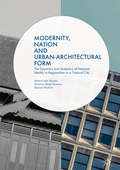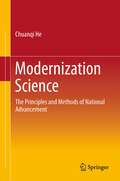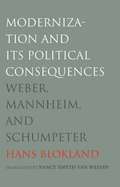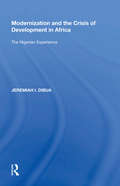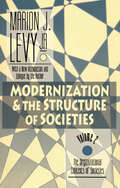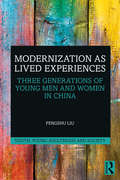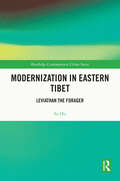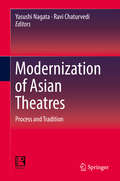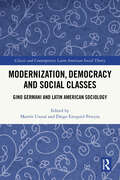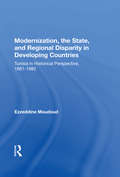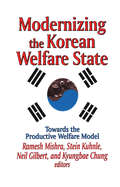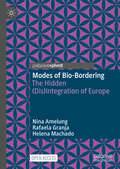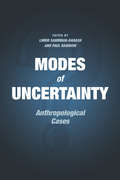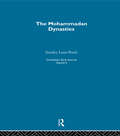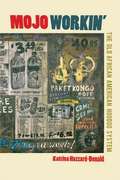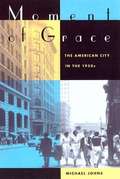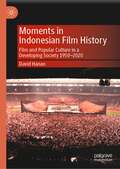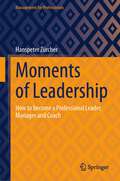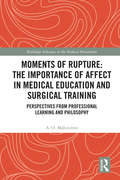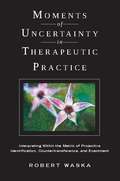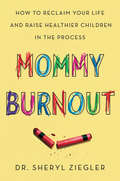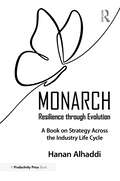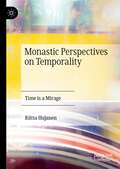- Table View
- List View
Modernity, Nation and Urban-Architectural Form: The Dynamics and Dialectics of National Identity vs Regionalism in a Tropical City
by Shireen Jahn Kassim Norwina Mohd Nawawi Mansor IbrahimThis book explores how Malaysia, as a multicultural modern nation, has approached issues of nationalism and regionalism in terms of physical expression of the built environment. Ever since the nation’s post-Colonial era, architects and policy makers have grappled with the theoretical and practical outcomes of creating public architecture that effectively responds to traditions, nationhood and modernity. The authors compile and analyse prevailing ideas and strategies, present case studies in architectural language and form, and introduce the reader to tensions arising between a nationalist agenda and local ‘regionalist’ architectural language. These dichotomies represent the very nature of multicultural societies and issues with identity; a challenge that various nations across the globe face in a changing environment. This topical and pertinent volume will appeal to students and scholars of urban planning, architecture and the modern city.
Modernization Science: The Principles and Methods of National Advancement
by Chuanqi HeDepending on their national level of income, development and modernization, all countries in the world can be generally categorized as either advanced or developing. Studies on why advanced countries continue to develop, how they maintain their level of development, and how developing countries enter into the advanced club fall into the field of "modernization science," which is an emerging interdisciplinary science. This monograph, the first English book available on "modernization science," interprets its concepts, methodologies, general theories, first and second modernization, six level-specific, six field-specific and three sector-specific modernizations, modernization policy and evaluation, and the principles and methods of national development since the 18th century. It provides clear, systematic, up-to-date information on this new discipline with more than 173 figures and 265 tables, and covers 131 countries and 97% of the global population. A comprehensive outlook on world modernization is presented from a Chinese perspective.
Modernization and Its Political Consequences: Weber, Mannheim, and Schumpeter
by Hans Blokland Nancy Smyth Van WeesepPeople's capacity to give meaning and direction to social life is an essential dimension of political freedom. Yet many citizens of Western democracies believe that this freedom has become quite restricted. They feel they are at the mercy of anonymous structures and processes over which they have little control, structures and processes that present them with options and realities they might not have chosen if they had any real choice. As a result, political interest declines and political cynicism flourishes. The underlying cause of the powerlessness pervading the current political system could be modernization. Taking the work of Max Weber, Karl Mannheim, and Joseph Schumpeter as a point of departure, Hans Blokland here examines this process. The topics covered are, among others, the meaning of modernization, the forces that drive it, and, especially, the consequences of modernization for the political freedom of citizens to influence the course of their society via democratic politics.
Modernization and the Crisis of Development in Africa: The Nigerian Experience (Interdisciplinary Research Series In Ethnic, Gender, And Class Relations)
by Jeremiah I. DibuaIn this book, Jeremiah I. Dibua challenges prevailing notions of Africa's development crisis by drawing attention to the role of modernization as a way of understanding the nature and dynamics of the crisis, and how to overcome the problem of underdevelopment. He specifically focuses on Nigeria and its development trajectory since it exemplifies the crisis of underdevelopment in the continent. He explores various theoretical and empirical issues involved in understanding the crisis, including state, class, gender and culture, often neglected in analysis, from an interdisciplinary, radical political economy perspective. This is the first book to adopt such an approach and to develop a new framework for analyzing Nigeria's and Africa's development crisis. It will influence the debate on the development dilemma of African and Third World societies and will be of interest to scholars and students of race and ethnicity, modern African history, class analysis, gender studies, and development studies.
Modernization and the Structure of Societies: The Organisational Contexts of Societies
by Marion J. Levy Jr.In Modernization and the Structure of Societies, Marion Levy shows the interdependencies of societies as a systematic whole in matters that are relevant for international affairs. He distinguishes different types of societies while simultaneously showing elements common to all societies. In a new epilogue being added to this edition, titled "Modernization Exhumed," the author alleges that criticism of modernization theory has generally been ideological or otherwise nonscientific. He provides a strong defense of his hypothesis. In his new introduction, he concentrates on the concept of interdependency. Modernization and the Structure of Societies is crucial to the understanding of contemporary international problems. It is a necessary addition to the personal libraries of sociologists, political scientists, and scholars of international affairs., Levy writes so as to produce strong reactions, but this does not obscure his real contribution. Because of his ambitious effort to synthesize a tremendous amount of available scholarship, the study is certain to last for a long time as a standard reference in the field of comparative sociology."—Morris Janowitz, American Journal of Sociology, "A giant book raising innumerable problems, often an exasperating book, yet important and likely to be much referred to by writers on comparative politics and administration."—Fred W. Riggs, American Political Science Review.
Modernization as Lived Experiences: Three Generations of Young Men and Women in China (Youth, Young Adulthood and Society)
by Fengshu LiuThis book examines, in a culturally and contextually sensitive way, the particularity of what it means to be young in post-Mao China undergoing rapid and dramatic transformation by comparing childhood and youth experiences over three generations. The analysis draws on life-history interviews with Beijing young men and women in their last upper secondary year, their parents and their grandparents. The book offers a comprehensive coverage of the various aspects of life pertinent to youth experiences and compares each of these across three generations, treating them as interrelated and mutually affecting processes – childhood, intergenerational relationships, education and future plans, gender and sexuality. By offering both men’s and women’s accounts of their childhood and youth experiences, which for the three generations combined extend over nearly a century, the book sheds useful light on how gender and sexuality have evolved in China. Fengshu Liu concludes that the young generation’s lives feature a ‘maximization desire’, in sharp contrast to the two older generations’ childhood and youth experiences. The book meticulously weaves rich ethnographic details and individual life stories into a larger and unfolding picture of historical, social and cultural trends, while providing critical insight into Chinese modernization and modernity against the backdrop of globalization. It can thus be an enjoyable read also for people beyond the academia interested in China’s social and cultural transformation and its children and youth.
Modernization in Eastern Tibet: Leviathan the Forager (ISSN)
by Su HuUsing ethnographic materials and documents from East Tibetan villages, this book addresses the impact of modernization on everyday life and the ways in which it melds with traditional forms of knowledge to create a new Tibetan identity and scientific rationality.Including cases centred on meteorology, geography, and seismology, the book assesses a wide range of traditional local activities, including foraging, farming, and domestic practices, and argues that and demonstrates how science, technology, and ideas about modernity have all influenced these activities. It highlights that when inconsistencies among different knowledges emerge, modernization can create inconsistent assemblages of modern and traditional practices and reveal the multiplicity of everyday life.Using these examples of everyday life to portray the complexity of day-to-day existence in Tibet, this book will be of huge interest to students and scholars of Tibet, China, human geography, anthropology, and the sociology of science and technology.
Modernization of Asian Theatres: Process and Tradition
by Yasushi Nagata Ravi ChaturvediThis volume focuses on the theatre history of Asian countries, and discusses the specific context of theatre modernization in Asia. While Asian theatre is one of the primary interests within theatre scholarship in the world today, knowledge of Asian theatre history is very limited and often surprisingly incorrect. Therefore, this volume addresses a major gap in contemporary theatre studies. The volume discusses the conflict between tradition and modernity in theatre, suggesting that the problems of modernity are closely related to the idea of tradition. Although Asian countries preserved the traditional form and values of their respective theatres, they had to also confront the newly introduced values or mechanisms of European modernity. Several papers in this volume therefore provide critical surveys of the history of theatre modernization in Asian countries or regions—Japan, Korea, Taiwan, Hong Kong, India Malaysia, Singapore, and Uyghur. Other papers focus on specific case studies of the history of modernization, discussing contemporary Taiwanese performances, translations of modern French comedy into Chinese, the modernization of Chinese Xiqu, modern Okinawan plays, Malaysian traditional performances, Korean national theatre, and Japanese plays during World War II. Renowned academics and theatre critics have contributed to this volume, making it a valuable resource for researchers and students of theatre studies, literature, and cultural studies.
Modernization, Cultural Change, and Democracy
by Ronald Inglehart Christian WelzelThis book demonstrates that people's basic values and beliefs are changing, in ways that affect their political, sexual, economic, and religious behaviour. These changes are roughly predictable: to a large extent, they can be interpreted on the basis of a revised version of modernisation theory presented here. Drawing on a massive body of evidence from societies containing 85 percent of the world's population, the authors demonstrate that modernisation is a process of human development, in which economic development gives rise to cultural changes that make individual autonomy, gender equality, and democracy increasingly likely. The authors present a model of social change that predicts how the value systems play a crucial role in the emergence and flourishing of democratic institutions - and that modernisation brings coherent cultural changes that are conducive to democratisation.
Modernization, Democracy and Social Classes: Gino Germani and Latin American Sociology (Classic and Contemporary Latin American Social Theory)
by Martín Unzué Diego Ezequiel PereyraGino Germani’s intellectual itinerary is a key step in the understanding of sociology in Latin America. Offering a fresh perspective, this book seeks to strengthen a better reflection on the history of sociology and social sciences in the region, through a reconstruction of the content and context of his enormous production and its legacies and legitimacies.The volume argues that Germani made a huge contribution to the development of sociology and social thought not only in Argentina and South America but also throughout Latin America, United States and Italy, with an enriching and original interdisciplinary perspective. It identifies his theoretical and conceptual proposals and empirical approach and discusses the implications of his ideas in different regional, national and local experiences and contexts. In particular, they promote the prospect of comparative studies focused on different areas of the Global South.A vital collection of work on a key thinker in Latin American Sociology for scholars and students of Sociology in the Americas and the Global South.
Modernization, The State, And Regional Disparity In Developing Countries: Tunisia In Historical Perspective, 1881-1982
by Ezzeddine MoudoudThis book provides a historical context for understanding why regional disparities emerged in Tunisia and why reducing those disparities has been so difficult. It implies that the failure of regional development in Tunisia does not lie in regional planning, which had never been seriously tried.
Modernizing the Korean Welfare State: Towards the Productive Welfare Model
by Neil GilbertModernizing the Korean Welfare State analyzes recent developments in social and public policy in South Korea. Its focus is the new approach to Korea's system of social protection, known as the productive welfare paradigm. This volume brings together an international group of scholars to examine the new paradigm and associated policy developments. In the first part, contributors examine the significance of the productive welfare paradigm and recent policy developments within a broader comparative and international perspective. They question the commitment to welfare in the paradigm, viewing it largely as an example of a global trend towards the "enabling state" in which social welfare serves largely economic goals. Other contributors situate the new paradigm in relation to globalization and its implications for national strategies of social protection developed in earlier times. The new departure in Korea is compared to European welfare state development, and contributors find it a bold attempt to fashion a comprehensive welfare state based on social rights. In the second part, contributors focus on specific issues and policy areas. These include the degree to which Korea has been following a "pro-poor" growth policy. They evaluate developments in the area of unemployment and work injury insurance. They review the progress of policies in the area of social insurance and assistance, and the American system of income support for low income earners and its lessons for Korean policymakers. Other contributors review the public pensions system in Korea, and environmental protection policies are discussed and the impact of those policies on the poor and people of color, who are disproportionately exposed to environmental hazards.
Modes of Bio-Bordering: The Hidden (Dis)integration of Europe
by Helena Machado Rafaela Granja Nina AmelungThis open access book explores how biometric data is increasingly flowing across borders in order to limit, control and contain the mobility of selected people, namely criminalized populations. It introduces the concept of bio-bordering, using it to capture reverse patterns of bordering and ordering practices linked to transnational biometric data exchange regimes. The concept is useful to reconstruct how the territorial foundations of national state autonomy are partially reclaimed and, at the same time, partially purposefully suspended. The book focuses on the Prüm system, which facilitates the mandatory exchange of forensic DNA data amongst EU Member States. The Prüm system is an underexplored phenomenon, representing diverse instances of bio-bordering and providing a complex picture of the hidden (dis)integration of Europe. Particular legal, scientific, technical and political dimensions related to the governance and uses of biometric technologies in Germany, the Netherlands, Poland, Portugal and the United Kingdom are specifically explored to demonstrate both similar and distinct patterns.
Modes of Uncertainty: Anthropological Cases
by Paul Rabinow Limor Samimian-DarahModes of Uncertainty offers groundbreaking ways of thinking about danger, risk, and uncertainty from an analytical and anthropological perspective. Our world, the contributors show, is increasingly populated by forms, practices, and events whose uncertainty cannot be reduced to risk--and thus it is vital to distinguish between the two. Drawing the lines between them, they argue that the study of uncertainty should not focus solely on the appearance of new risks and dangers--which no doubt abound--but also on how uncertainty itself should be defined, and what the implications might be for policy and government. Organizing contributions from various anthropological subfields--including economics, business, security, humanitarianism, health, and environment--Limor Samimian-Darash and Paul Rabinow offer new tools with which to consider uncertainty, its management, and the differing modes of subjectivity appropriate to it. Taking up policies and experiences as objects of research and analysis, the essays here seek a rigorous inquiry into a sound conceptualization of uncertainty in order to better confront contemporary problems. Ultimately, they open the way for a participatory anthropology that asks crucial questions about our contemporary state.
Modes of Uncertainty: Anthropological Cases
by Paul Rabinow Limor Samimian-Darah and Paul RabinowModes of Uncertainty offers groundbreaking ways of thinking about danger, risk, and uncertainty from an analytical and anthropological perspective. Our world, the contributors show, is increasingly populated by forms, practices, and events whose uncertainty cannot be reduced to risk—and thus it is vital to distinguish between the two. Drawing the lines between them, they argue that the study of uncertainty should not focus solely on the appearance of new risks and dangers—which no doubt abound—but also on how uncertainty itself should be defined, and what the implications might be for policy and government. Organizing contributions from various anthropological subfields—including economics, business, security, humanitarianism, health, and environment—Limor Samimian-Darash and Paul Rabinow offer new tools with which to consider uncertainty, its management, and the differing modes of subjectivity appropriate to it. Taking up policies and experiences as objects of research and analysis, the essays here seek a rigorous inquiry into a sound conceptualization of uncertainty in order to better confront contemporary problems. Ultimately, they open the way for a participatory anthropology that asks crucial questions about our contemporary state.
Mohammadan Dyn: Classes Iii-x (classic Reprint)
by Stanley Lane-PoolFirst published in 1999. Routledge is an imprint of Taylor & Francis, an informa company.
Mojo Workin': The Old African American Hoodoo System
by Katrina Hazzard-DonaldIn this book, Katrina Hazzard-Donald explores African Americans' experience and practice of the herbal, healing folk belief tradition known as Hoodoo. Working against conventional scholarship, Hazzard-Donald argues that Hoodoo emerged first in three distinct regions she calls "regional Hoodoo clusters" and that after the turn of the nineteenth century, Hoodoo took on a national rather than regional profile. The first interdisciplinary examination to incorporate a full glossary of Hoodoo culture, Mojo Workin': The Old African American Hoodoo System lays out the movement of Hoodoo against a series of watershed changes in the American cultural landscape. Throughout, Hazzard-Donald distinguishes between "Old tradition Black Belt Hoodoo" and commercially marketed forms that have been controlled, modified, and often fabricated by outsiders; this study focuses on the hidden system operating almost exclusively among African Americans in the Black spiritual underground.
Moment Of Grace: The American City In The 1950s
by Michael JohnsMoment of Grace tells the story of the American city in its remarkable heyday. Never before or after the 1950s were downtowns so exciting, neighborhoods so settled, or suburban dwellers so optimistic. Urban culture was at its peak: it was vital, urbane, conformist, and generating rebellion all at once. Capturing the mood of the '50s in superb historical photographs and mining delightfully varied sources—including urban critics, interviews with city residents, novels, songs, magazines, and newspapers—Moment of Grace brings alive the downtowns, the neighborhoods, and the suburbs of the era. A rich historical reflection on a singular decade, the book also portrays the '50s as a critical turning point in American culture and economy. Michael Johns shows us exactly why city life never could or would be the same again. Giving a vivid sense of the lived experience of the day, Johns explores the '50s in cities such as New York, San Francisco, Philadelphia, Chicago, and Oakland, writing about fashion (which demanded the highest heels and pointiest breasts in history), nightlife, architecture, literature, business and economic trends, and teenage culture. He tells us what was for sale in the stores, who lived in the neighborhoods, what life was like for women in the brand-new suburbs, and much more. And he confronts difficult issues head-on. What did the loss of city jobs and the simultaneous success of the civil rights movement mean for black neighborhoods? What were the profound consequences of the rise of the suburbs for family life? In contrast to the vibrant cities of the '50s, the streets of today's downtowns are often empty if not suffused with melancholy. Johns uncovers the seeds of the transformation from the '50s to today, and at the same time, he paints a memorable picture of the American past.
Moments in Indonesian Film History: Film and Popular Culture in a Developing Society 1950–2020
by David HananThis book explores Indonesian cinema, focusing on moments of unique creativity by Indonesian film artists who illuminate important but less-widely-known aspects of their multi-dimensional society. It begins by exploring early 1950s ‘Indonesian neorealist films’ of the Perfini group, which depict the ethos and emerging moral issues of the period of struggle for independence (1945–49). It continues by discussing four audacious political allegories produced in four discrete political eras—including the Sukarno, Suharto and Reformasi periods. It also surveys the main approaches to Islam in both popular cinema and auteur films during the Suharto New Order. One chapter celebrates the popular songs and B-movies of the Betawi comedian, Benyamin S, which dramatize the experience of the poor in ‘modernizing’ Jakarta. Another examines persisting Third World dimensions of Indonesian society as critiqued in two experimental features. The concluding chapter highlights innovation in a renewed Indonesian cinema of the post-Suharto Reformasi period (1999–2020), including films by an unprecedented generation of women writer-directors
Moments of Leadership: How to become a Professional Leader, Manager and Coach (Management for Professionals)
by Hanspeter ZürcherThere are moments in leadership when opportunities open up: Opportunities for better teamwork, opportunities for orientation, for professional conversations, and for personal development and reflection. This book describes over 60 such opportunities, pragmatic, solution-oriented, and tested for many years. Based on concrete examples, it thus provides impulses for effective strategies and new ways of solving problems in all areas of cooperation and leadership. The book is intended to serve as a guide from which not only leaders but also managers and coaches can benefit.
Moments of Rupture: Perspectives from Professional Learning and Philosophy (Routledge Advances in the Medical Humanities)
by A. O. MahendranSurgery is a craft specialty: ‘doing’ in response to what is seen, felt and anticipated. The potent odours and the raw images of flesh, elicit strong sensations and responses in the here-and-now or ‘thisness’ (haecceities) of practice. These experiences, trigger a world of affects and senses that can disturb or rupture familiar or established ways of thinking and knowing. This book attempts to articulate these emotional complexities of learning and practice by exploring affective encounters with the uncertainty of medical events. Employing a practice based inquiry, grounded in philosophical notions of affect and related concepts, real stories of actual practice are analysed and theorised to examine how events of clinical practice come to matter or become meaningful to surgeons, potentially disclosing new or modified capacities to see, think, understand and act. The philosophical writings of Alfred North Whitehead, Gilles Deleuze, Gilbert Simondon and Brian Massumi inform the exploration. The critical discussions of this book are relevant for healthcare professionals, medical educators, practitioners and researchers interested in its main exploration: the affective conditions that emerge from disturbances in practice and their power to shape, construct and transform how professionals understand their practice and function within it.
Moments of Uncertainty
by Robert WaskaOne of therapy's greatest challenges is the moment of transference, when a patient unconsciously transfers emotion or desire to a new and present object, in some cases the therapist. During the course of treatment, a patient's projections and the analyst's struggle to divert them can stress, distort, or contaminate the therapeutic relationship. It may lead to various forms of enactment, in which the therapist unconsciously colludes with the client in interpretation and treatment, or projective identification, in which the client imposes negative feelings and behaviors onto the therapist, further interfering with analysis and intervention.
Mommy Burnout: How to Reclaim Your Life and Raise Healthier Children in the Process
by Dr Sheryl G. ZieglerThe ultimate must-read handbook for the modern mother: a practical, and positive tool to help free women from the debilitating notion of being the "perfect mom," filled with funny and all too relatable true-life stories and realistic suggestions to stop the burnout cycle, and protect our kids from the damage burnout can cause.Moms, do you feel tired? Overwhelmed? Have you continually put off the things you need to do for you? Do you feel like it’s all worth it because your kids are happy? Are you "over" being a mother? If you answered yes to these questions, you’re not alone. Parents today want to create the ideal childhood for their children. Women strive to be the picture-perfect Pinterest mother that looks amazing, hosts the best birthday parties in town, posts the most "liked" photos, and serves delicious, nutritious home-cooked meals in her neat, organized home after ferrying the kids to school and a host of extracurricular activities on time.This drive, while noble, can also be destructive, causing stress and anxiety that leads to "mommy burnout." Psychologist and family counselor Dr. Sheryl Ziegler is well-versed in the stress that moms face, and the burden of guilt they carry because they often feel like they aren’t doing enough for their kids’ happiness. A mother of three herself, Dr. Z—as she’s affectionately known by her many patients—recognizes and understands that modern moms are all too often plagued by exhaustion, failure, isolation, self-doubt, and a general lack of self-love, and their families are also feeling the effects, too.Over the last nineteen years working with families and children, Dr. Z has devised a prescriptive program for addressing "mommy burnout"—teaching moms that they can learn to re-energize themselves and still feel good about their families and their lives. In this warm and empathetic guide, she examines this modern epidemic among mothers who put their children’s happiness above their own, and offers empowering, proven solutions for alleviating this condition, saving marriages and keeping kids happy in the process.
Monarch: A Book on Strategy Across the Industry Life Cycle
by Hanan AlhaddiMonarch: Resilience through Evolution is a comprehensive guide on strategy across the industry life cycle, taking readers on an insightful journey through the dynamic world of business. Drawing inspiration from the resilient and adaptive nature of the monarch butterfly, this book offers a fresh perspective on strategic decision-making in today’s ever-changing business environment. Central to the narrative is the concept of the industry life cycle, which serves as the foundational context for strategy development and deployment in organizations. It considers the complexities of organizations as adaptive systems and industries as aggregates of organizations, emphasizing the importance of adaptability, persistence, and strategic agility. Monarch advocates for approaching strategy as a living process aligned with this perspective. Through insightful analyses and real-world examples, the book illustrates how organizations can navigate uncertainty and thrive in the face of adversity. At each phase of the life cycle, guidance on organizational self-assessment, strategy development, strategy deployment, and common pitfalls to avoid is provided. An innovative approach to the strategy cascade is introduced, using the notion of "magnifying lenses" to ensure strategic alignment across corporate, business, and functional-levels. The book then transitions into pursuing strategy as a negotiation and concludes with a special note on the strategic imperative and considerations for leadership.
Monastic Perspectives on Temporality: Time is a Mirage
by Riitta HujanenIn this book, Riitta Hujanen explores temporality in the context of Catholic enclosed contemplative traditions. It investigates, based on literature and other sources, what enclosed contemplatives might say about temporality through their monastic journeys. What makes a young person decide to dedicate their life inside a cloister? Do contemplatives have a preference for eternity over temporal time? How does the enclosed contemplative life impact one’s concept of time? How is time perceived towards the end of one’s monastic journey? What is seen when looking back to the years in the enclosed contemplative life? What is experienced at the hour of death?The answers to these questions illustrate a paradoxical dynamic in monastic journeys that cover a broad historical scope from the earliest monastic writers to contemporary sources.
